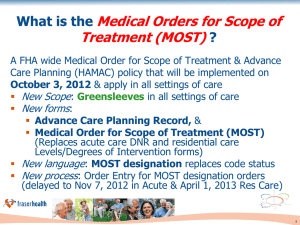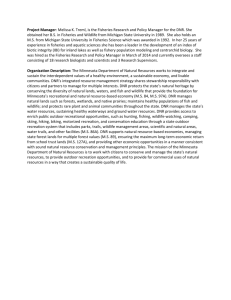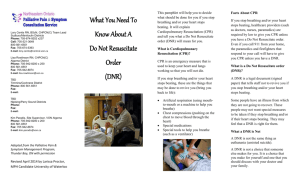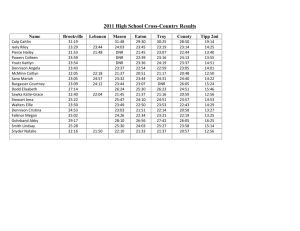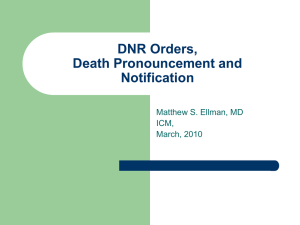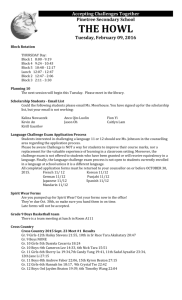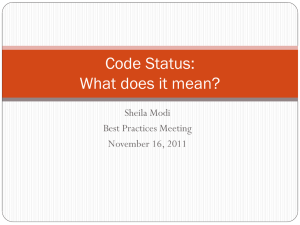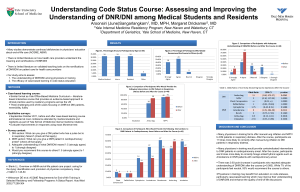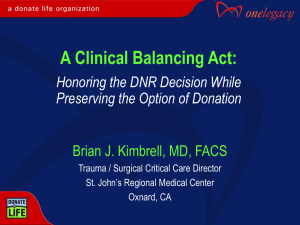Death
advertisement
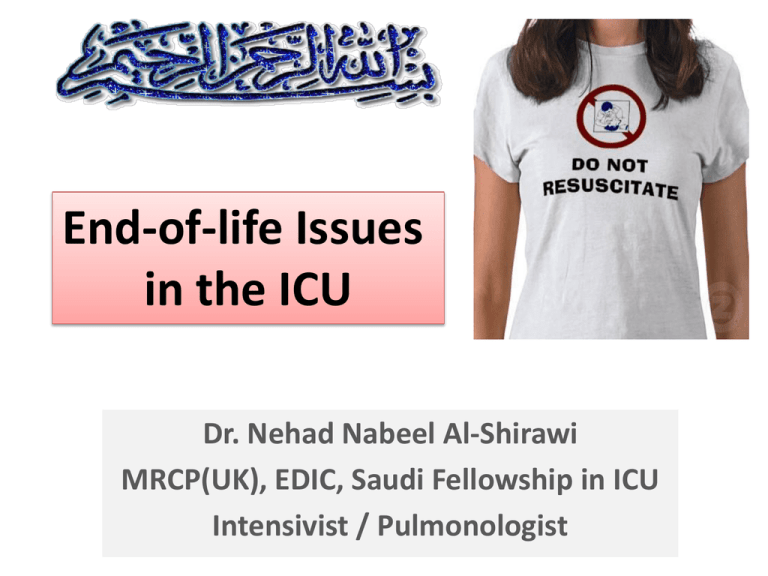
End-of-life Issues
in the ICU
Dr. Nehad Nabeel Al-Shirawi
MRCP(UK), EDIC, Saudi Fellowship in ICU
Intensivist / Pulmonologist
بسم هللا الرحمن الرحيم
‘And whosoever saves a
life, it is as if they have
saved the whole of
’humankind
علَى َبنِي إِس َرائِي ْل َ أَ َّن ْه
ك َك َتب َنا َْ
{مِنْ أَج ِْل َذلِ َْ
ض َف َكأ َ َّن َما
سادْ فِي األَر ِ ْ
سا ِب َغي ِْر َنفسْ أَوْ َف َ
َمن َق َت ْل َ َنف ً
ِيعا َو َمنْ أَحْ َياهَا َف َكأ َ َّن َما أَحْ َيا
َق َت ْل َ ال َّن َْ
اس َجم ً
ت ث َّْم إِنَّْ
اس َجمِي ًعا َولَ َقدْ َجاءتهْمْ رسل َنا ِبال َب ِّيَْنا ِْ
ال َّن َْ
ض لَمس ِرفونَْ}
ك فِي األَر ِ ْ
َكثِيرْاً ِّمنهم َبعدَْ َذلِ َْ
Qur’an 5:32
Presentation Outline
•
•
•
•
•
•
Problems with DNR decision in our societies
Definitions
When to consider DNR
Islamic Point View of DNR
My Study
Conclusions
Problems with DNR Decisions in
Our Societies
Problem # 1
Ignorance
Many people are so ignorant to
understand the meaning of “DNR” and
futility of treatment.
Problem # 2
Misconceptions Regarding Death
Misconceptions among most of the
population leading to lack of
understanding and acceptance of
“DEATH”.
!!!!!!!! )ْ(يحيْالعظامْوهيْرميم
Problem # 3
Misconceptions Regarding Role of HCP
Confusion about our role as health care
providers (save lives at any cost)
ْ(احناْعملناْإ ّليْعلينا
)والباقيْعليْهللا
DNR Guideline: How Much of
Islamic Point-View
• Guidelines are necessary to identify the key ethical
and legal issues that govern DNR decisions
• The guidelines provide a framework to support
physician in
1. Making DNR decisions
2. Communicating them effectively
• Islamic point-view should be considered ALL the time
Definitions
DNR
• Instructions that the patient should not receive
cardiopulmonary resuscitation (CPR) in the event
that he / she suffers a cardiac arrest, usually in the
hospital
• Do not intubate, do not defibrillate, no medications
Life – Prolonging Measures
•
•
•
•
•
Intravenous Fluids
Nasogastric tube feeding
Dialysis
Vasopressors
Mechanical ventilation
Medical Futility
• When CPR and other critical care efforts have no
reasonable chance of prolonging life or providing
benefit to the patient – i.e. they are futile
– Discharge to home intact
– Pain / symptom free life
– Full awareness of the surroundings
Euthanasia
• Euthanasia: comes from the Greek “Eu-thanatos” which
means “ an easy or good death”
• Killing the patient for their own benefit
Death
• Death has several consequences
Medical
Legal
Religious
Socioeconomic
1.
2.
3.
4.
(خروج الروح من الجسد) • Death = body – spirit
• قال هللا تعالى ( :قل يتوفاكم ملك الموت الذي و ّكل بكم ثم إلى
ربكم ترجعون ) السجدة 11
• ( ويسألونك عن الروح قل الروح من أمر ربي وما أوتيتم من
العلم إال قليال) االسراء 58
Death
• Medical Definition: The irreversible cessation of
all vital functions especially as indicated by
permanent stoppage of the heart, respiration,
and brain activity
• In many countries : Brain Death = Death
• In Islamic countries – disagreement
When to Consider DNR ?
When to Consider DNR ?
1. CPR is unlikely to useful (Futile)
2. CPR is not in accord with a valid advance directive
3. CPR is not in accord with a competent patient’s
recorded and sustained wishes
4. Resuscitation is likely to be followed by a length
and quality of life that would not be in the best
interest of the patient (pain, lack of awareness)
Emergency Situations
• In emergencies, there will rarely be time to make a
proper assessment of the patient’s condition and the
likely outcome of CPR and so attempting CPR will
usually be appropriate
• Health professionals will make all reasonable efforts
to attempt to revive the patient in the event of
cardiac or respiratory arrest
It is Important to Explain that:
• No CPR does not mean no other treatment
• No CPR does not mean withdrawal of mechanical
ventilator, etc
• No CPR does not mean “Mercy Killing”
Islamic Point-View
What’s Unique about Ethics in
Islam
What is Moral in Islam is Always Legal (Halal)
Human Life
But if one saves a life,
it shall be as if he
saved all mankind.”
Qur’an 5:32.
“Every soul shall taste
death”
Qur’an 3:185.
Death:
International Collective Of Islamic Jurists And
OIC. Amman, Jordan 1986
• Declaration of death:
– Heart and breath have stopped and the condition
is irreversible OR
– Mental function has ceased and the condition is
irreversible
– Responsibility of the physician
١٣ -٨ ) الصادرعن مجلس مجمع الفقه اإلسالمي المنعقد في دورة مؤتمره الثالث بعمان من٥ ( القرار رقم
في دورة مؤ تمره٨٨ / ٠٨ /٤ ) د١ ( وقراره رقم، ١٩٨٦ تشرين األول/ أكتوبر١٦- ١١ / ه١٤٠٧ صفر
١٩٨٨ شباط/ فبراير١١ -٦ الموافق/ ه١٤٠٨ جمادى اآلخرة٢٣ - ١٨ الرابع بجدة في السعودية من
Time of Death
• Time of Death = Complete cardiopulmonary arrest
after withdrawal
• المريض الذي ركبت على جسمه أجهزة اإلنعاش يجوز رفعها إذا
تعطلت جميع وظائف دماغه تعطالا نهائيا ا وقررت لجنة من ثالثة
أطباء اختصاصيين خبراء أن التعطل ال رجعة فيه ،وإن كان القلب
والتنفس ال يزاالن يعمالن بفعل األجهزة المركبة ،لكن ال يحكم بموته
شرعا ا إال إذا توقف التنفس والقلب تاما بعد رفع األجهزة
في قرار المجمع الفقهي اإلسالمي التابع لرابطة العالم اإلسالمي في دورته العاشرة المنعقدة في
مكة المكرمة 1408هـ
4 Ethical Principles
4 Ethical Principles in Islam
Principle of maslahah (Self and public interest) is to
address the needs of humankind and confers the
welfare of most people.
The principle of la darar wa la dirar (a person must
not harm himself or someone else) – prohibited to
cause a loss to another person
The Major Islamic Ruling Principles
The Sharia Law System
Arabic
Do it
Not do it
Fard
Wajeb
Reward
Punishment
Mustahab
Mandub
Reward
No Punishment
Mubah
Halal
No Reward
No Punishment
Discouraged
(Disliked)
Makruh
Manboth
No Punishment
Reward
Forbidden
(Prohibited)
Haraam
Mahd’ur
Punishment
No Reward
Category
Obligatory
(Prescribed)
Recommended
(Desirable)
Permitted
(Allowed)
28
Is Medical Treatment Necessary?
• Definite:
o
o
o
The desired results are achieved without fail
e.g. stop bleeding to sustain life
Mandatory )(واجب
• Probable/Expected:
o
o
o
The desired results are often achieved but not always
e.g. many medical treatments
Sunnah )(سنه
• Imagined:
o
o
o
The desired results are not a realistic expectation
e.g. some medical treatments
Permissible )(مباح
Resuscitation In Islam
• Two opinions
(مندوب)= حكم التداوي 1. Recommended
(فرض كفاية) = إنقاذ الروح 2. Obligatory
• Most people agree on second opinion
because
• المريض ال اختيار له في هذه الحال فال يمكن إجراء حكم التداوي
على مسألة اإلنعاش
• المريض في في حالة خطرة وحاجته ألجهزة اإلنعاش أصبحت أمراا
ضروريا ا كحاجته للطعام والشراب بحيث لو تركه فقد عرض نفسه
للهالك
Fatwa # (12086) Dated (1989) by the Saudi
Committee for Fatwa & Islamic Affairs
Fatwa # (12086) Dated (1989) by the Saudi
Committee for Fatwa & Islamic Affairs
Permitted (Mubah)
Do Not Resuscitate order: when the treatment
becomes futile.
Withdrawal or withheld therapy is permitted in
brain death.
Forbidden (Haraam)
Active Euthanasia:
Passive Euthanasia: Patient should be provided with
food, drink, nursing, and relief from pain until death.
Suicide
Murder. "take not life which Allah has made sacred" Qur’an 6:151.
What About Withdrawal ?
• In patients with deep coma/persistent
vegetative state –forbidden (Haram) by most
authorities
• In Brain Death – many authorities said is
allowed (Halal)
،١٩٨٧ مجمع الفقه اإلسالمي الثالث التابع لمنظمة المؤتمر اإلسالمي المنعقد في عمان باألردن عام
ه١٤٠٨ /٢ / ٢٤ وفتوى المجلس الفقهي التابع لرابطة العالم اإلسالمي في دورته العاشرة في
? What About Withdrawal
• إذا قرر ثالثة أطباء متخصصون فأكثر رفع أجهزة اإلنعاش عن المريض
الموضحة حالته في السؤال األول (حالة عجز شديد -مثل :الشلل الدماغي ،
ومصاب بتخلف عقلي شديد) -فإنه يجوز اعتماد ما يقررونه من رفع أجهزة
اإلنعاش ،ولكن ال يجوز الحكم بموته حتى يعلم ذلك بالعالمات الظاهرة الدالة
على موته ،أما موت الدماغ فال يعتمد عليه في الحكم بموته
• إذا قرر األطباء المختصون رفع األجهزة في الحالة المذكورة في السؤال األول ،
فإنه ال يلتفت إلى معارضة األهل
• إذا غلب على ظن الطبيب المختص أن الدواء ينفع المريض وال يضره أو أن نفعه
أكثر من ضرره ،فإنه يشرع له مواصلة عالجه ،ولو كان تأثير العالج مؤقتا؛
ألن هللا سبحانه قد ينفعه بالعالج نفعا مستمرا خالف ما يتوقعه األطباء .
[ قرار هيئة كبار العلماء) رقم ( ) 190وتاريخ 1419/ 4/ 6هـ
My Study
My Study
• Questionnaire-based study
• 12-questions questionnaire distributed to physicians
at SMC
• Total sample size 152 physicians
Basic Characteristics
Characteristic
Number
Percent
Age < 40 years
103/144
71.5
Age ≥ 40 years
41/144
28.5
Male
109/152
71.7
Female
43/152
28.3
Muslims
140/150
93.3
Other Religions
10/150
6.7
Sub-specialty
Total Number = 135
51.1%
25.9%
17.7%
5.3 %
Professional Level
Answer
to Policy
Questions
DNR
Do you Feel Comfortable or at Ease when Talking to
Relatives about DNR??
Do you Feel Comfortable or at Ease when Talking to
Relatives about DNR??
Majority of females don’t feel comfortable )P value < 0.05)
Withdrawal in Brain Dead
There is a significant number of physicians
Who said NO !!!!
Why not Withdrawing in Brain
Dead ?
Persons Involved in DNR
Decision
The main persons involved in DNR decisions are the
Caring Team and consultant
Reasons for Making DNR
Conclusions
Conclusions
• There are many misconceptions concerning DNR
decisions among health care professionals
• In the era of resource utilization and scares ICU beds,
making DNR decisions might seem necessary if the
treatment is futile
• A clear Law is needed to regulate this matter
